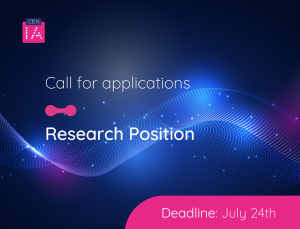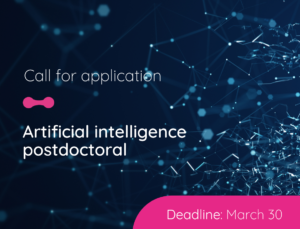
Carlos Aspillaga, a researcher at the National Center for Artificial Intelligence (Cenia), studied the dispute between the main Internet search engines after the successful use of the ChatGPT platform. In his analysis, Aspillaga has examined the strategies used by the different players in the market and assessed the impact that this artificial intelligence (AI)-based technology has on the evolution of this dispute. His conclusions offer a perspective on the future trends in this field, and the opportunities that this “conversational bot” technology opens up for users and startups.
ChatGPT is a prototype artificial intelligence chatbot -introduced in late 2022 by U.S. company OpenAI- that specializes in dialogue. The chatbot is a language model tuned with both self-supervised and reinforcement learning techniques. It is based on OpenAI’s GPT-3.5 model, an enhanced version of GPT-3 released in 2020. In other words, says Carlos Aspillaga, the development builds on an existing one. “In simple terms, GPT-3 is a system capable of generating text, which is given an initial instruction and continues to generate the following paragraphs
autonomously. The innovation of ChatGPT is that it was given a different format, to transform it into a chatbot capable of interacting with the user. You can converse and ask the system for things, which the chatbot responds to in a very eloquent”.
According to the developers, the dialog format makes it possible for ChatGPT to answer follow-up questions, admit its mistakes, question incorrect assumptions and reject inappropriate requests.
For the Cenia researcher, the user’s task is not only to know how to give precise instructions to the system, but also to discriminate the correct answers from those that are not, even if they appear to be correct. “The software makes errors, usually not very noticeable, in a significant fraction of the cases,” says Aspillaga. “Although the technology has been around for a few years, its new version is accompanied by extensive research to improve the dialogues the system delivers, to align them with the answers people find appropriate. So, although it is a system based on artificial intelligence, it has quite a bit of human intelligence.”
One of the distinctive features of this technology, as the local specialist adds, is its versatility. It seeks to be a “generalist” technology, that is to say, with the potential for a wide range of uses. The same creators and users are still discovering the potential uses that can be given to these systems, which also explains its massive opening and free access in its basic format by the brand developing the technology, which has begun to provide evidence of what applications could have in a real context.
“While still preliminary, we are already beginning to see some of its main uses. One of them is to make more tedious, complex or repetitive tasks more efficient, for example, in copywriting or to break what is known as the empty page syndrome. The user gives ChatGPT the indications, and the system can provide an initial writing proposal for the text to be written, whether it is an e-mail, article or summary,” Aspillaga adds.
“More than replacing, its contribution is to provide more efficiency and enhance human creativity, something that could have many applications in the professional field,” says Aspillaga, who leads the OpenCenia initiative, which is also evaluating possible developments to adapt this technology to the Chilean and Latin American reality. Such developments will be available to the community through OpenCenia, a platform that seeks to make artificial intelligence based components available in an open and free way to push Chile to become a pillar of AI development in the region.
Google in jeopardy
Aspillaga predicts that ChatGPT could in the medium term become a tool adapted to different industries, responding to “conversational” requests for different purposes. A few days ago, the first application along these lines was published, and it is a renewed version of the web search engine “Bing”, Google’s competitor.
The platform created by Microsoft is now integrated with a successor to ChatGPT, and its functionalities are gradually being made available. The goal is for the chatbot to be able to deliver a direct response to the user without the need for the user to go through the search results one by one.
Sridhar Ramaswamy, a former Google executive, told Bloomberg that ChatGPT could be disruptive to Google’s sponsored ad business by reducing users’ interest in clicking on banner ads, which are the company’s main breadwinner. Ramaswamy said that an interaction in a ChatGPT-like format provides a better user experience than traditional search.
In early 2021 Google had developed its own chatbot, LaMDA, but did not release it to the public at that time. With the success of ChatGPT, Google was forced to backtrack on the words of its executives, who indicated that they had no intention of launching a competitor to ChatGPT. This fact materialized with Google’s recent announcement, presenting its “Bard” system, based on LaMDA, which would fulfill similar functionalities to those introduced by Bing. Unfortunately for them, soon after it was announced, some detractors were already publishing deficiencies in the system. Company employees called the launch “rushed,” and admit that bugs during the preliminary demonstration of Bard affected Google’s reputation, which was the trigger for the company’s stock value to plummet more than 9%.
In an internal email recently leaked by Business Insider, current Google CEO Sundar Pichai states that the company is at an uncomfortable, but exciting and challenging moment. He asks all his employees to contribute to the development of Bard by investing part of their working day to test the system internally. The executive mentions in the text that “the most important thing we can do right now is to focus on creating a great product and developing it responsibly.”
The Chilean specialist points out that “Google is a very large company, and therefore it is expected that they should be cautious when making decisions or implementing drastic changes to their business. This opens up a great opportunity for smaller companies to act with greater speed, being able to propose disruptive solutions that capture the attention of the market, as we recently saw with ChatGPT.”
“There is already a first generation of artificial intelligence models capable of solving many things that were previously unsolvable. The vast majority of these elements are available as opensource or can be used from the Cloud at a very low cost.” “This brings down many of the barriers that kept smaller companies out of the market dominated by large technology companies. The pieces of the puzzle are now available to anyone, and I believe that in 2023 we will see how new players find new ways to assemble them, bringing very interesting changes for users,” says Aspillaga.
Competent, but not enough
Since its launch, the ChatGPT platform has received a lot of attention from various sectors. In fact, in less than five days since its launch, the system reached more than one million registered users, an unprecedented figure for technological disruptions and one that not even platforms such as Facebook or Twitter have reached.
It only took a few days for researchers around the world to put ChatGPT to the test to explore its potential. One that generated the most buzz was conducted by a professor at the Wharton School of the University of Pennsylvania, who found that the AI-powered chatbot was able to pass the final exam of an MBA program. Professor Christian Terwiesch, author of the research, said the bot passed with a score between B- and B on the Wharton MBA operations management course exam.
The bot “showed a remarkable ability to automate some of the skills of highly paid knowledge workers” (including analysts, consultants and managers). Its work, the U.S. scientist said, “was incredible in basic operations management and process analysis questions, including those based on case studies,” but it also showed “surprising errors” in basic mathematics. Moreover, according to the article published last January 17, it proved to be “remarkably good at modifying its answers in response to human suggestions.”
Jon Choi, an academic at the University of Minnesota Law School, conducted a similar experiment to measure ChatGPT’s capabilities in lawyer evaluations. The study involved 95 multiple-choice questions and 12 written questions, and they were sent out for scoring without any indication that they came from an artificial system. The software passed all four tests with an average performance equivalent to C+. Choi indicated that ChatGPT had problems with detecting potential legal issues and with in-depth analysis of the application of legal rules to the facts of a case, although he also indicates that “it could be very useful in producing a first draft that the student can then refine.”
ChatGPT was also tested on the United States Medical Licensing Examination (USMLE), obtaining average scores slightly above the minimum passing score. The published study indicates that the answers provided by the platform are equivalent to a second-year medical student for the first part of the exam, a fourth-year medical student for part 2CK, and a first-year resident physician for the third part of the exam. The authors indicate that the bot performs worse on the same tests that physicians consider difficult. The results “match the subjective difficulty and objective performance of real test takers,” the authors state.
For the Cenia researcher, these results are encouraging. “The tests to which ChatGPT has been subjected show us that, with a little more work, this technology can become very useful in practically any discipline. They also position these tools where they should go: as a support and amplifier of human productivity and creativity, not as a substitute.”
For Aspillaga, beyond its current performance, the main contribution of the ChatGPT platform is the demonstration that it is possible to build direct interactions between users and algorithms. “Beyond what happens in the future, one of the benefits of this whole revolution is that it has democratized access to AI, because until not long ago people, unless they were scientists or academics, did not interact directly with this technology. ChatGPT has made artificial intelligence available to mass users in a friendly way. Its great success is to democratize knowledge and bring it closer to everyone.” Regarding the system’s shortcomings, he indicates that “they should improve as the technology matures and the aspects where improvement efforts need to be focused are discovered.”
By: Luis Francisco Sandoval. Agencia Inés Llambías Comunicaciones.







